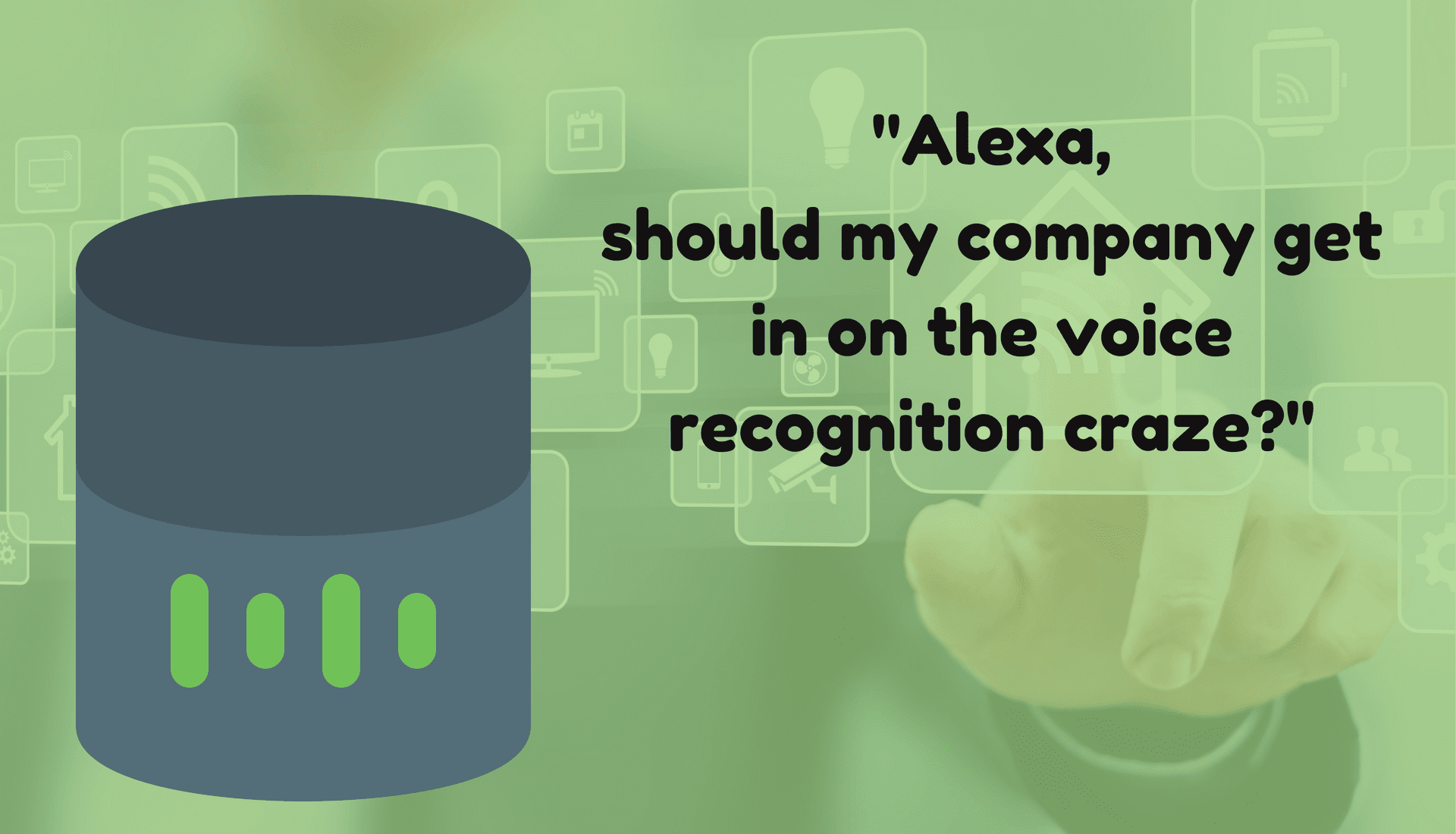“Alexa, should my company get in on the voice recognition craze?”
If only the answer to that question were as easy as asking Alexa … or Google … or even Siri! Voice recognition and voice activation software have come a long way. And let’s face it – it’s so much faster to order your digital assistant around or ask it a question than it is to type out your question in a search bar or to get up and dim the lights.
Voice activation/recognition is one of the hottest trends in technology right now. According to TechCrunch, 39 million Americans (that’s one in six) own a smart speaker. Grand View Research reports that the market value of voice recognition technology in 2016 was around $51.09 billion. The same report predicts that the market will experience an annual growth rate of approximately 11% over the next 10 years. As a business owner, it makes you wonder, “Should I be preparing for a voice recognition revolution?”
Voice recognition may not apply to your industry directly right now but that doesn’t mean it won’t later. Or, perhaps incorporating it ahead of your competitors could make you a disruptive force in your industry. Have you thought about how voice searches could affect how people find out about your business? These are the top 4 voice recognition technology trends to watch and consider to see if they affect (or will affect) what you do.
Voice Activated Technology
If you need more evidence that consumer- and corporate-use of voice activated and voice recognition technology is on the rise, consider that by 2019, voice recognition technology will have become a $601 million industry. Voice activated technology is not new, but thanks to a growing number of cloud-based APIs, it has never been more attainable. Voice activation and voice recognition go hand in hand. Businesses that sell devices for the Internet of Things (IoT), such as Samsung’s smart TV or Jibo, or applications that could benefit from voice recognition should pay attention to how this trend and the technology are developing. Bonus: Your developers don’t have to know natural language processing to develop voice recognition.
Voice-Driven Apps on Alexa and Google Home
The rise of IoT devices and voice assistants has created new opportunities when it comes to things you can control with your voice. Big brands have been hopping on the bandwagon quickly to be the first to have “Works with Alexa” or “Works with Google” apps.
From starting your Whirlpool dishwasher to ordering a pizza, there’s a whole world of apps and devices that work by commanding Amazon Alexa or Google Assistant. Both platforms have self-service APIs, tools, documentation, and code samples for anyone who wants to build “voice-first” experiences.
Internal Business Use
Voice recognition can go beyond ordinary domestic uses, such as creating playlists, ordering a pizza or starting your dishwasher. When it’s enhanced with AI, chat bots, or other technology, it can improve efficiencies and change the way work is done within your organization. Amazon Alexa has a full of list of offerings for businesses interested in streamlining their processes. This goes beyond allowing Alexa to manage your schedule or control the temperature of the office. For example:
- Salesforce has Alexa Skills, which make it easy for users to access Einstein Analytics, Insights and other Salesforce capabilities.
- Amazon Chime lets users join meetings using their voice in large conference rooms and small huddle rooms.
- Volara provides a fully integrated and easily customized solution that works with Alexa for Business for hotel guest rooms.
- Acumatica has an Alexa Skill that lets warehouse workers check and replenish inventory.
If you develop and sell any sort of SaaS product, incorporating voice recognition technology is something you should definitely look into. But even if you don’t, just integrating voice activation into your workspace could help with efficiency.
Voice Search
One of Gartner’s top 10 strategic predictions during the Gartner Symposium/ITxpo was that “by 2020, 30 percent of web browsing sessions will be done without a screen.” Think about it. How often do you ask your smartphone search-related questions, such as, “Where’s the nearest coffee shop?” or “Who wrote that song about sweaters?” [writer’s note: Weezer, “The Undone Sweater Song”]
If this topic hasn’t been discussed by your marketing team, add it to the list. Voice search is a whole other animal. The traditional approach to targeting keywords needs to be different if you want to win the SEO war for voice searching. You’ll need to look at longer keyword queries (because users tend to use more complex sentences) and overall topics over specific terms.
It’s also important to know that most digital assistants only deliver the top search results, making it more important to be higher on the search results list.
Voice search will affect the way users interact with websites as well. Start thinking about “audio only” experiences when it comes to your website. Just like when mobile took over, how you present information on your website may need to be adjusted for the “audio first” experience.
Have we convinced you of the importance of voice recognition yet? We’ll close with this spot-on prediction that Bill Gates made in a Seybold Seminar all the way back in 1997.
“In this 10-year time frame, I believe that we’ll not only be using the keyboard and the mouse to interact, but during that time we will have perfected speech recognition and speech output well enough that those will become a standard part of the interface.” — Bill Gates, at Seybold, San Francisco, 1 October 1997
Have you already been thinking about voice recognition technology in your own business – or is it something you’re curious about exploring now? Feel free to reach out to us for an initial conversation. We’d love to brainstorm with you, and initial consultations are always free.
And, if this is something your business has already been looking into or you know it’s what you want, let us help. Download our RFP guide to help you start planning your new voice-related project.






